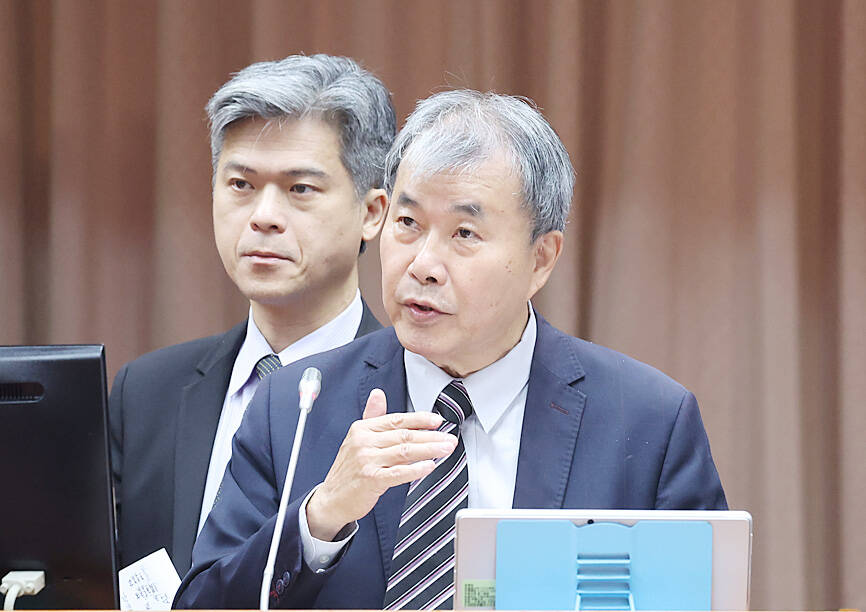The Ministry of Education (MOE) yesterday said it is developing educational materials that are designed to reinforce students’ Taiwanese identity and enhance awareness of Chinese threats.
Minister of Education Cheng Ying-yao (鄭英耀) made the remarks at a meeting of the legislature’s Education and Culture Committee, in response to questions about educators advocating pro-China positions in class.
Democratic Progressive Party (DPP) Legislator Lin I-chin (林宜瑾) said that Taipei First Girls’ High School Chinese literature teacher Alice Ou (區桂芝) reportedly taught in class that Taiwan is part of China.

Photo: CNA
Citing another example, Lin said a parent of a third-grade student also told her that their child’s homeroom teacher taught students that “we are all Chinese.”
Lin expressed concern that children might be confused about their national identity because of these teachings.
Other lawmakers cited the case of National Tsing Hua University professor Jou Jwo-huei (周卓煇), who took 28 students on a five-day academic exchange tour to China during the Tomb Sweeping holiday. China reportedly footed the bill for food and accommodation.
Chou defended the tour, saying the trip was purely for academic research and had nothing to do with Beijing’s “united front” work.
Lawmakers urged the education ministry to pursue solutions to the problem.
Cheng replied that individual safety would not be possible without national security.
“The purpose of the Fundamental Act of Education [教育基本法] is to develop national consciousness and a global perspective. The Social Studies Tutoring Group for Primary and Secondary Schools is compiling educational materials designed to reinforce students’ national identity and enhance their literal awareness of threats from China, which should be completed during the summer vacation. We hope teachers of history, government and geography can attend training sessions for these materials and convey the right information and perspective to students,” Cheng said.
While individuals are entitled to their cultural preferences, educators must be neutral and their freedom of speech is protected under the Fundamental Act of Education, Cheng said.
Lawmakers also asked ministry officials if universities can deny students’ rights to set up tables to gather signatures for the recall campaigns against Chinese Nationalist Party (KMT) legislators.
Cheng said that the act bans universities from advocating agenda for specific political groups, but it does not ban university students from voluntarily participating in civic activities.
Their freedom of speech should be protected so long as they are not promoting the agenda of specific political parties, Cheng said.

The Coast Guard Administration (CGA) yesterday said it had deployed patrol vessels to expel a China Coast Guard ship and a Chinese fishing boat near Pratas Island (Dongsha Island, 東沙群島) in the South China Sea. The China Coast Guard vessel was 28 nautical miles (52km) northeast of Pratas at 6:15am on Thursday, approaching the island’s restricted waters, which extend 24 nautical miles from its shoreline, the CGA’s Dongsha-Nansha Branch said in a statement. The Tainan, a 2,000-tonne cutter, was deployed by the CGA to shadow the Chinese ship, which left the area at 2:39pm on Friday, the statement said. At 6:31pm on Friday,

The Chinese People’s Liberation Army Navy’s (PLAN) third aircraft carrier, the Fujian, would pose a steep challenge to Taiwan’s ability to defend itself against a full-scale invasion, a defense expert said yesterday. Institute of National Defense and Security Research analyst Chieh Chung (揭仲) made the comment hours after the PLAN confirmed the carrier recently passed through the Taiwan Strait to conduct “scientific research tests and training missions” in the South China Sea. China has two carriers in operation — the Liaoning and the Shandong — with the Fujian undergoing sea trials. Although the PLAN needs time to train the Fujian’s air wing and

The American Institute in Taiwan (AIT) put Taiwan in danger, Ma Ying-jeou Foundation director Hsiao Hsu-tsen (蕭旭岑) said yesterday, hours after the de facto US embassy said that Beijing had misinterpreted World War II-era documents to isolate Taiwan. The AIT’s comments harmed the Republic of China’s (ROC) national interests and contradicted a part of the “six assurances” stipulating that the US would not change its official position on Taiwan’s sovereignty, Hsiao said. The “six assurances,” which were given by then-US president Ronald Reagan to Taiwan in 1982, say that Washington would not set a date for ending arm sales to Taiwan, consult

A Taiwanese academic yesterday said that Chinese Ambassador to Denmark Wang Xuefeng (王雪峰) disrespected Denmark and Japan when he earlier this year allegedly asked Japan’s embassy to make Taiwan’s representatives leave an event in Copenhagen. The Danish-language Berlingske on Sunday reported the incident in an article with the headline “The emperor’s birthday ended in drama in Copenhagen: More conflict may be on the way between Denmark and China.” It said that on Feb. 26, the Japanese embassy in Denmark held an event for Japanese Emperor Naruhito’s birthday, with about 200 guests in attendance, including representatives from Taiwan. After addressing the Japanese hosts, Wang